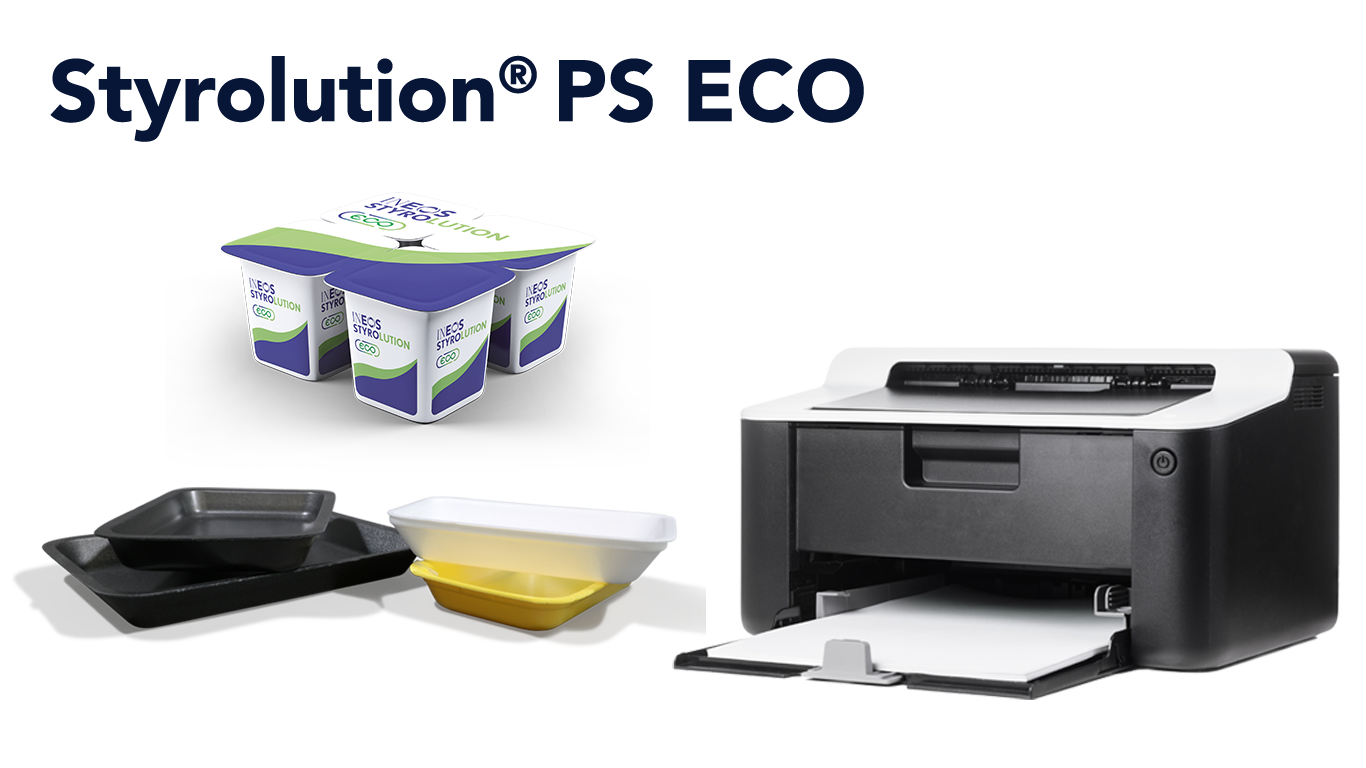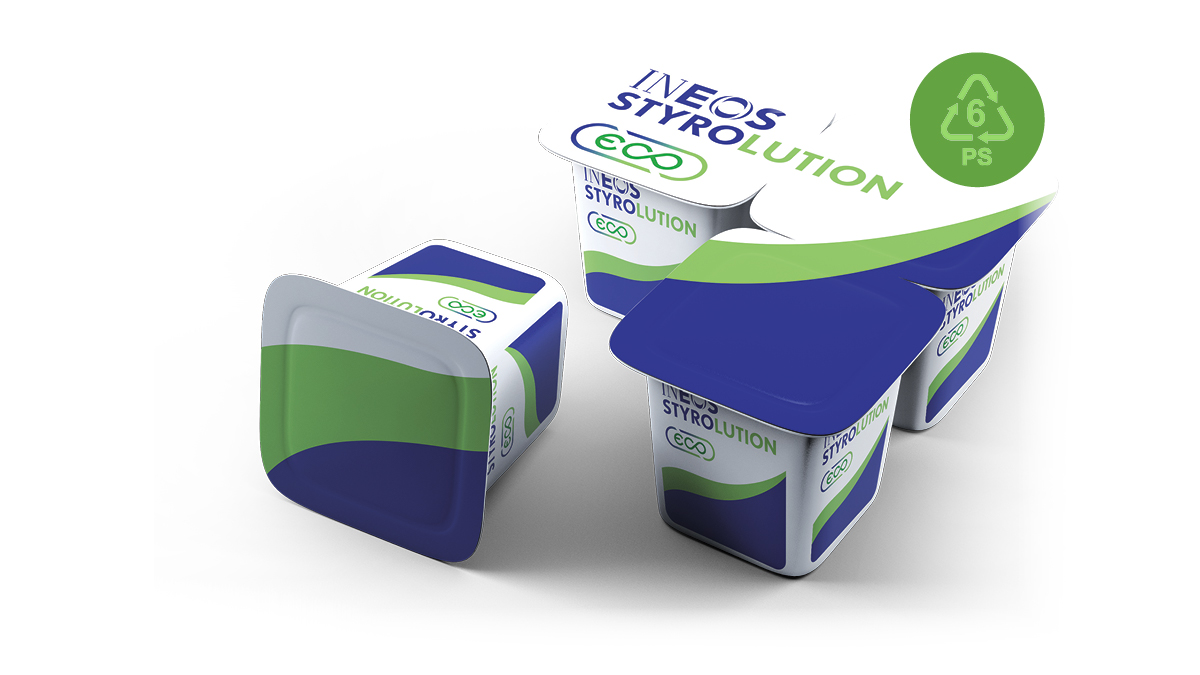Our portfolio of Styrolution® PS ECO solutions has grown significantly over time. Today, we can proudly say that we now have an unrivalled portfolio that includes both mechanically recycled and bio-attributed materials.

Polystyrene has received significant attention in the industry over the past months and years. The industry association Styrenics Circular Solutions (SCS), of which we are a founding member, has contributed greatly to putting polystyrene recycling at the forefront of the circular plastics economy. In parallel, we have been working hard to bring a broad range of sustainable PS solutions to the market – both, through recycled solutions as well as bio-attribution.
Mechanical recycling of polystyrene: Moving from strength to strength
Today, all our mechanically recycled polystyrene products for food contact applications contain 100% post-consumer recycled content, and the Styrolution® PS ECO 440FC grade produced from household food packaging waste is available with a food contact statement.
This was made possible thanks to the work done by Tomra and SCS.
Minimising waste, maximising recyclingIn 2020, Tomra, a recognised leader in waste collection via deposit systems and sorting, announced that polystyrene is one of the best sortable plastics in the waste stream. Its near-infrared (NIR) technology) sensor technology revealed that polystyrene can be sorted at a purity higher than 99.9%. This finding was the beginning of investing heavily not only in advanced recycling technologies for PS, but also exploring mechanical recycling in detail. The same year, SCS demonstrated that mechanically recycled polystyrene is suitable even for food contact. Only half a year later, in mid-2021, INEOS Styrolution introduced mechanically recycled polystyrene developed in close collaboration with Tomra. Styrolution® PS ECO 440 MR100 WHITE became the first available grade that year. The suffix “MR100” indicates that the material contains 100% post-consumer mechanically recycled content. Meanwhile, SCS has submitted two applications for an opinion of the European Food Safety Authority (EFSA) on the use of recycled polystyrene as food contact material: the first submission in October 2020, followed by a second one in February 2022. |
Polystyrene, the material of choice in the dairy industry
The fact that polystyrene is recyclable is just one more benefit of this unique material. The material’s excellent properties, the fact that it is easier and faster to process, and its unique snapping characteristics contribute to the fact that it is the ideal choice for multi-pack yoghurt pots[1]. It is thus no surprise that a recognised leader in the dairy industry like Unternehmensgruppe Müller started to collaborate with us in 2019 already on developing a circular solution for polystyrene. Since then, they have explored our mechanical recycling and bio-attributed solutions and are also closely following our efforts to develop a circular economy based on advanced recycling.
A breakthrough for mechanically recycled polystyrene for the dairy industry came with our recent announcement together with COEXPAN. In their research and development center for packaging solutions (Innotech), they have successfully completed trials with the full range of yoghurt cup formats using our Styrolution PS ECO 440FC MR100 material, a 100% post-consumer recycled polystyrene grade produced from household food packaging waste. All dairy formats have been produced and tested to food contacts standards.
Our uncompromising mechanically recycled polystyrene
Our polystyrene portfolio includes general purpose polystyrene (GPPS) resins and impact modified polystyrene (HIPS) resins. GPPS resins are transparent polymers suitable for injection moulding or extrusion applications. They are typically used for food service, food packaging, refrigerator components, building & construction, and healthcare applications. HIPS resins, also suitable for extrusion and injection molding, are typically used for yoghurt cups, food packaging, electronic devices, and durable fridge liners.
In the Asia-Pacific market, Styrolution PS ECO 260 MR85 is addressing the household and electronics industries, while in EMEA, Styrolution PS ECO 440FC MR100 is targeting the dairy industry.
Functional barrier solutionsFor certain applications, moving towards a circular economy requires new technologies that optimise the use of recycled materials. A common concept is to cover recycled material with fossil-based material. Co-injection is one of the technologies that offer such a solution, which are using for PS and ABS. The reason for such an approach with ABS (e.g. in the electronics and automotive industries) is to take advantage of the surface properties and the mechanical properties of fossil-based ABS, while benefitting from incorporating post-consumer recycled ABS in the core of the product[1]. With polystyrene, a similar concept is used for a different reason. Fossil-based polystyrene acts as a functional barrier in food packaging hiding a core of recycled polystyrene that is not certified for food contact. Several of our customers have already been using this technology for some time. More recently, SCS has also been promoting a similar solution with polystyrene as a safe functional barrier. |
Our polystyrene goes green
Our new bio-attributed polystyrene products are made from styrene sourced from renewable ISCC-certified feedstock. Using this new feedstock as a replacement for fossil-based feedstock results in a substantial greenhouse gas saving compared to conventional polystyrene, and the product carbon footprint of bio-attributed Styrolution® PS ECO is at least carbon neutral or even better (offering a negative carbon footprint). All our bio-attributed polystyrene products are produced according to an ISCC-certified mass balance approach.
Bio-attributed polystyrene products can be recognised by the suffix “BC100” in their name, where “100” indicates that an amount of ISCC-certified bio-circular feedstock equivalent to 100% of the product is attributed to the final material.
All our bio-attributed products have identical physical and mechanical properties as their fossil-based counterparts, as well as all the same regulatory documents available. Therefore, when switching to INEOS Styrolution’s bio-attributed products, no new material approval processes are required. The bio-attributed GPPS product “Styrolution® PS ECO 168N BC100”, for example, is identical to the existing “Styrolution® PS 168N” material, but with 100% of the feedstock attributed from ISCC-certified sources.
Advanced recycling – an outlook
While mechanical recycling continues to drive greater results than initially anticipated, we remain committed to the pursuit of advanced recycling technologies for polystyrene.
Advanced recycling solutions include depolymerisation, pyrolysis or gasification, which allow for the use of mixed plastic waste. In summer of 2022, we signed an offtake agreement with Indaver, a leading player in the European waste industry, giving us access to styrene monomer produced from post-consumer waste at their planned depolymerisation plant in Belgium.
[1] These solutions are currently investigated by us in collaboration with our R&D partner NMB in Bayreuth, Germany.


